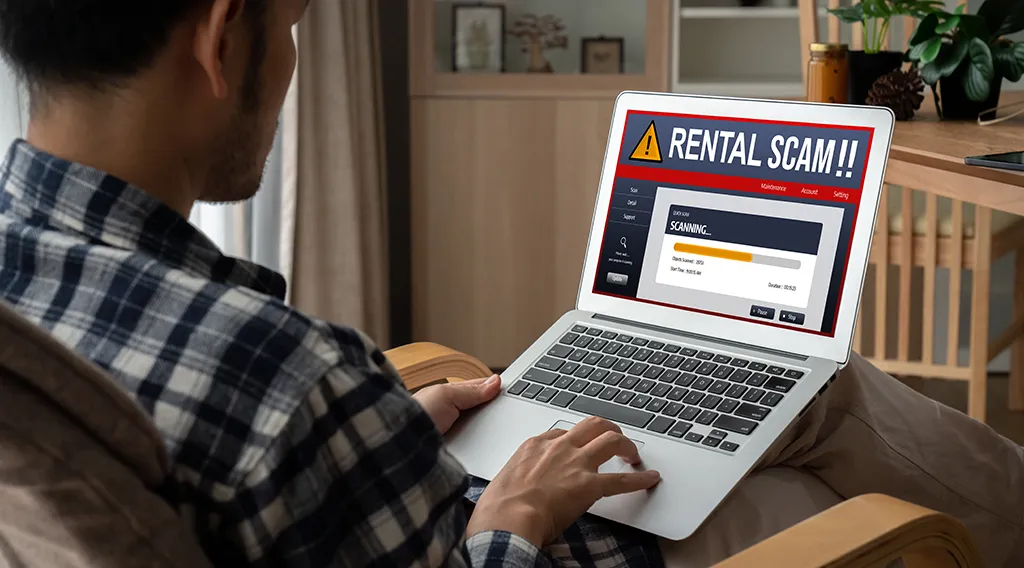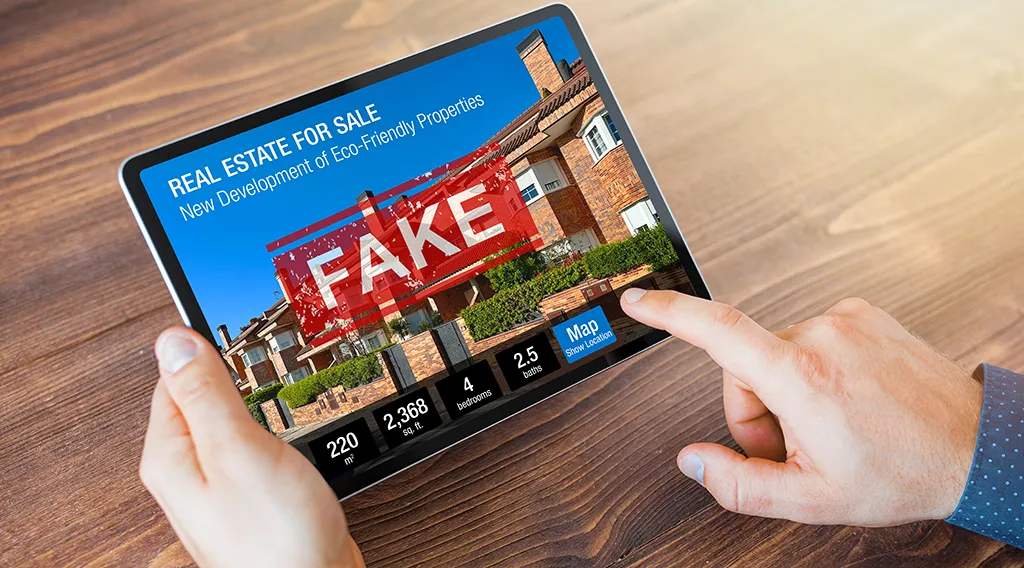If you’ve been searching for a home to rent in Thailand, there’s one important thing to keep in mind: rental scams in Thailand are becoming increasingly common.
Every month, both locals and expats fall victim to scammers posing as legitimate landlords or agents. They post fake listings, demand upfront deposits, and then vanish once the money lands in their account. For foreigners unfamiliar with Thai rental practices and legal protections, it’s all too easy to get caught in these traps, especially when arranging accommodation remotely.
What Is a Rental Scam in Thailand?

A rental scam occurs when someone impersonates a property owner or agent to steal deposits or advance payments from unsuspecting renters. In some cases, the scammer may even list properties that are in foreclosure or unavailable.
Scammers prey on people who are in a hurry or simply looking for a good deal, and often target expats, retirees, and students searching for affordable, quality housing. Scammers typically operate online, using platforms like Facebook Marketplace, LINE groups, and rental forums to reach victims.
Example of Recent Rental Scam in Thailand: Student Loses Deposit to Fake Facebook Landlord
In July 2025, a Thai university student in Nonthaburi lost 18,000 THB after falling for a Facebook rental scam. Searching for an affordable room, he thought he’d found a great deal: a condo for just 6,000 THB per month. The “landlord,” using a fake Facebook profile, convinced him to transfer a 12,000 THB deposit and the first month’s rent. The keys were even sent via motorbike courier. But when he arrived, he found a court notice taped to the door; the unit had been repossessed, and the scammer had disappeared after blocking all contact from the victim.
Unfortunately, this is a common scenario. These scams don’t just target locals; expats are regularly caught out too, especially those booking properties before arriving in Thailand.
Why Expats Are Especially at Risk of Rental Scams in Thailand
While anyone can fall victim to a Thai rental scam, expats and travelers tend to be at greater risk for several reasons:
- Limited Ability to Verify Listing: It’s much harder to inspect properties in person or verify landlords when you’re searching from overseas.
- Unfamiliarity with Local Prices: Without a clear understanding of typical rental rates, it’s easy to be misled by offers that seem like a “great deal” but are, in fact, overpriced for the property valuation.
- Time Pressure: Many expats are under pressure to secure housing quickly, especially when travel dates, job relocations, or visa deadlines are approaching, making them more susceptible to rushed decisions.
- Language Barrier: A lack of Thai language skills can make it difficult to find and communicate with legitimate landlords or spot red flags in conversations and contracts.
- Complex Legal Recourse: Pursuing legal action in Thailand as a foreigner can be daunting, particularly if you’re unfamiliar with local legal procedures or lack easy access to support networks.
Scammers know this and target foreigners specifically because it’s harder for you to fight back.
Types of Rental Scams in Thailand

Rental scams in Thailand can take several forms, including:
- Fake Listings and Scammers Posing as Landlords
Scammers create fake listings for non-existent or unavailable properties, using stolen photos and below-market prices to attract attention. They often impersonate landlords or agents by using forged documents, pressuring renters to pay deposits or booking fees before viewing. In some cases, they go as far as arranging fake key handovers, as seen in the Nonthaburi student case. Victims only discover the fraud when they arrive and find the property either does not exist or is unavailable. - Double-Renting and Unauthorized Sublets
This scam involves real properties but fraudulent agreements. Scammers rent or gain access to legitimate properties, then illegally sublet them to multiple people at once or rent them out without the owner’s knowledge. Victims only realize the scam when they arrive to find someone else already living there or discover the property has legal issues, such as repossession.
- Social Media Deposit Theft and Hidden Charges
Even with legitimate rentals, dishonest landlords can exploit renters through unfair terms. This includes charging inflated deposits and rental prices, refusing to return deposits without cause, adding undisclosed fees, or inflating utility costs. Expats are especially vulnerable to being quoted higher rents or misled by vague or verbal agreements that favor the landlord.
How to Avoid Rental Scams in Thailand
The Thai rental market offers plenty of excellent housing opportunities, but renters should be cautious, especially when dealing with landlords or agents they’ve only met online. Here are several practical steps to reduce your risk of falling victim to a rental scam:
Work With a Reputable Real Estate Professional
If you’re new to Thailand, work with a licensed real estate agent or an established agency with a verified track record when searching for a property. If you find anything remotely suspicious, partner with a reputable Thai property lawyer to review contracts for legality and validity, and provide other protections that reduce your risk of fraud.
Look for Real Estate Red Flags
Be cautious of:
- Deals with unrealistically low rent.
- Landlords who refuse to provide viewings or make excuses to avoid in-person meetings.
- High-pressure tactics urging you to pay immediately.
- Payment requests via QR code, e-wallet, or personal accounts.
- Fake contracts sent via chat apps.
Verify Property Ownership
Before paying, make sure to:
- Request the agent’s and the owner’s ID cards.
- Confirm the bank account name matches the owner.
- Request the house registration (Tabien Baan, AKA “blue book”), utility bills, or title deed.
- Cross-check ownership with building management (for condos) or the Thai Land Office (for houses and townhomes).
- Never pay without a written lease that’s been reviewed by a legal professional.
A legitimate landlord should have no issue with these verification steps.
Always View the Property in Person
Never pay a deposit or rent before physically inspecting the property. Scammers often avoid in-person meetings, claiming to be overseas or unavailable. Viewing the property allows you to:
- Confirm it exists and matches the listing photos.
- Verify access with the landlord or agent in person.
- Inspect the condition of the property firsthand.
- Check the neighborhood and building amenities.
If you absolutely must rent remotely, ask a trusted friend or reputable agent to visit on your behalf and verify all ownership documents before transferring any money.
Keep Records of Communications
While Facebook groups and online forums can be convenient for finding rentals, they are also common hotspots for scams. Always approach listings with caution, and keep detailed records of all communications, including chat messages, screenshots of listings, payment receipts, and any identification provided. These records will be vital if you need to report fraud or pursue criminal charges or civil legal action against scammers.
Request a Written Lease Agreement
Always insist on a written lease agreement, preferably in both English and Thai, so you fully understand the terms. A proper contract should detail the monthly rent, deposit amount, utility charges, rental period, and the conditions for deposit return. If anything is unclear or seems unfavorable, have a Thai property lawyer review the agreement before signing to ensure your rights are protected.
What to Do If You Are Scammed by a Fake Landlord in Thailand
If you have fallen victim to a rental scam in Thailand, it is important to act quickly. Take the following steps to increase your chances of successfully recovering your funds and catching the scammer:
- File a report at your local police station and with the Thai Tourist Police (1155).
- Contact the Anti-Online Scam Operation Center (AOC) at 1441 for online fraud.
- Notify your bank’s fraud division to attempt a transaction reversal.
- Inform your embassy or consulate to obtain assistance with legal procedures.
- Consider hiring a local Thai fraud lawyer to pursue legal action and potentially recover lost funds.
Legal Assistance for Rental Properties and Rental Scams in Thailand
At Siam Legal, we understand the challenges foreigners face when renting property in Thailand, whether it’s avoiding scams or navigating unfamiliar rental laws. With over two decades of experience assisting expats, our bilingual team of qualified attorneys and consultants offers comprehensive support for all your rental needs.
We provide legal assistance to victims of rental scams, working directly with Thai police, courts, and cybercrime units to help clients recover losses and hold scammers accountable. Whether you’re already in Thailand or planning your move, we guide you through the reporting process and help protect your rights.
In addition to fraud cases, we offer rental assistance services to help you avoid problems before they happen. This includes lease review, contract negotiation, and due diligence checks by licensed property lawyers to ensure you’re dealing with legitimate landlords and fair rental terms.
Contact Siam Legal for a confidential consultation. Whether you need help recovering a deposit, filing a police report, or simply reviewing a lease agreement, our experienced team is here to protect you from dishonest landlords and expensive scams.



